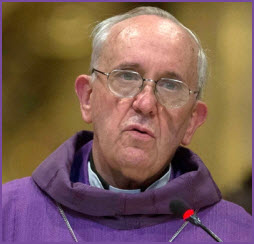Part of our fascination with the election of a pope is the opportunity we all have to meet someone real. Not the creation of a marketing campaign or focus groups, but someone we’ve never met before who has committed his life to something larger than himself and is defined by the web of those commitments. We don’t get the chance to meet someone new like this everyday.
 As we were introduced to Francis, much of what we had been hearing about over the past couple of weeks seemed either wrong or irrelevant. It wasn’t about changes in doctrine, sex scandals, political intrigue or financial mismanagement. It turned out to be about somebody who seems to be wired completely differently.
As we were introduced to Francis, much of what we had been hearing about over the past couple of weeks seemed either wrong or irrelevant. It wasn’t about changes in doctrine, sex scandals, political intrigue or financial mismanagement. It turned out to be about somebody who seems to be wired completely differently.
Francis didn’t surge onto the balcony at St. Peters when he was introduced and make it about him. Instead he asked everyone assembled in the square for their prayers. After he was chosen, he didn’t take the throne above the other electors to accept their good wishes and fealty, but instead stood among them. When the cardinals toasted him at dinner he told them they might live to regret it.
He didn’t take the limo. He didn’t have someone pay his hotel bill for him in Rome, or book his own ticket home to Argentina: he did all those things himself. He cooks his own meals too. This is different, telling.
Prayerful. Humble. Inclusive. Identifying with the poor and weak more than with the powerful.
A branding campaign could have come up with those words for him, and scripted his rise—but it didn’t, and that’s part of what grabbed our attention. In an age when we package and re-package ourselves to achieve our objectives, it was compelling to meet someone new who just may be authentic, the real thing—instead of someone who is merely trying to appear that way.
Much has been made of his naming himself after St. Francis of Assisi, whose commitment to the poor and weak was a rebuke to the rich and powerful of his own time. By forging this connection, the new Francis has connected himself to something essential in the Church (it is the poor and the meek who shall inherit the earth after all). His own ministering to AIDs victims and prostitutes at the margins of society for more than 50 years also connects him.
In the end, we will know this new pope not only by what he does today and tomorrow, but also by what he has already done. Not the marketing of a life, but the living of a life that is connected to a web of obligations and commitments that speak eloquently about who you are.
In this regard, as we meet Francis we should slso be wondering about his personal courage on behalf of two of his priests when they were fighting a repressive regime in Argentina several years ago. Whether he spoke truth to power in the way that he needed to is also at the core of his personal authority and authenticity. When the dust settles, he may need to find ways to have this conversation with us too. There are many ways he can put the issue behind him.
In the following weeks and months, I think we will also get to hear from him things we have not heard in a long time: the Church speaking about more than its own scandals and failings. By taking up the cause of social justice that extends from the first Francis through Ignatius (the founder of his Order) and now down to him, this new pope is committing himself, and hopefully the Church itself, to something deep and abiding that it is for.
We know only too well what the Church is against: married priests, women priests, homosexuality, the fallibility of the pope himself as teacher, and not against enough, namely some of its own failed priests. Against this backdrop, hearing in a clear and authentic voice what the Church is for is important.
This is not just about Catholics.
The whole world needs the Church of Yes and not merely the Church of No.
Leave a Reply